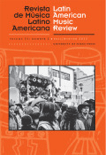
LATIN AMERICAN MUSIC REVIEW-REVISTA DE MUSICA LATINOAMERICANA
Scope & Guideline
Innovating Research at the Intersection of Music and Identity
Introduction
Aims and Scopes
- Cultural Politics of Music:
The journal focuses on how music interacts with cultural politics, exploring themes of inequality, identity, and social movements within Latin America. - Transnational Musical Practices:
It examines the transnational aspects of Latin American music, highlighting how various genres evolve through cultural exchanges and global influences. - Historical Contextualization:
A significant area of interest is the historical analysis of music, including the impact of colonialism, nationalism, and socio-political changes on musical forms and practices. - Ethnomusicology and Field Research:
The journal often features ethnographic studies, emphasizing field research that provides insights into local musical traditions and community practices. - Interdisciplinary Approaches:
It encourages interdisciplinary research that combines musicology with other fields such as sociology, anthropology, and cultural studies, broadening the understanding of music's role in society.
Trending and Emerging
- Music and Social Movements:
There is a significant rise in studies linking music to social movements, particularly regarding protests and political activism, highlighting the role of music in shaping public discourse. - Gender and Identity in Music:
Emerging themes include the exploration of gender and identity, particularly in how women and LGBTQ+ communities express themselves through music, underscoring the intersectionality within musical practices. - Digital Media and Music Consumption:
The influence of digital media on music consumption, production, and dissemination is increasingly examined, reflecting contemporary shifts in how music is experienced and understood. - Cultural Hybridity and Fusion:
The journal is seeing more focus on cultural hybridity, where traditional and contemporary musical forms intersect, creating new genres and practices that reflect complex identities. - Environmental and Ecological Themes:
Emerging discussions around music's role in environmental activism and ecological concerns are becoming more common, indicating a growing awareness of the socio-environmental impact of musical practices.
Declining or Waning
- Traditional Folklore Studies:
There seems to be a waning interest in purely traditional folklore studies, as contemporary themes and modern interpretations of music gain more attention. - Static Historical Narratives:
Publications that provide static or uncritical historical narratives about Latin American music are becoming less prevalent, indicating a move towards more dynamic and critical analyses. - Exclusive Genre Studies:
Focus on individual genres without considering their context or evolution appears to be declining, as researchers increasingly seek to understand music within broader cultural and political frameworks.
Similar Journals
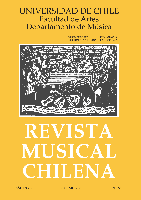
Revista Musical Chilena
Bridging Tradition and Innovation in Musical DiscourseRevista Musical Chilena, an esteemed publication from the Faculty of Arts at Universidad de Chile, has been a pivotal platform in the field of music and cultural studies since its inception in 1945. With a commitment to open access, this journal promotes the dissemination of innovative research and critical discourse that bridges the gap between cultural theory and musical practice. Holding a notable Q2 ranking in both the Cultural Studies and Music categories as of 2023, it serves as a vital resource for scholars and professionals alike. The journal's inclusion in the Scopus database, with rankings that reflect its influence in the arts and humanities, underscores its significance in shaping the contemporary landscape of music studies. Given its convergence of research output from 2007 to 2024, Revista Musical Chilena continues to engage its audience with diverse scholarship that reflects Chilean musical heritage and global cultural dynamics.
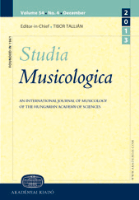
Studia Musicologica
Unveiling the Rich Tapestry of Music's HistoryStudia Musicologica, published by AKADEMIAI KIADO ZRT, stands as a leading journal in the field of musicology, dedicated to the exploration and analysis of music across diverse cultures and historical contexts. With its ISSN 1788-6244 and E-ISSN 1789-2422, this journal provides an essential platform for disseminating high-quality research and critical analyses, thereby contributing significantly to scholarly discourse in music studies. Although it operates on a traditional access model, its rigor and foundational contributions ensure that it remains invaluable for researchers, professionals, and students alike. Situated in the heart of Hungary, Studia Musicologica engages with a broad spectrum of topics including music theory, ethnomusicology, and music history, fostering a deeper understanding of music's multifaceted role in society. This makes it an essential resource for anyone interested in advancing their research or professional practice within the expansive field of musicology.
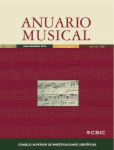
Anuario Musical
Championing excellence in Music and Performing Arts.Anuario Musical, with its ISSN 0211-3538 and E-ISSN 1988-4125, is a prestigious journal in the fields of Music, Visual Arts, and Performing Arts, published by CONSEJO SUPERIOR INVESTIGACIONES CIENTIFICAS-CSIC in Spain. Since becoming an Open Access journal in 1995, it has played a crucial role in disseminating cutting-edge research and fostering scholarly communication in these dynamic disciplines. The journal has achieved notable rankings in the 2023 category quartiles, being placed in Q2 for Music and Q1 for Visual Arts and Performing Arts, reflecting its commitment to high-quality scholarship. Furthermore, it is indexed in Scopus with respectable ranks—#294/667 in Visual Arts and Performing Arts and #105/180 in Music—underscoring its relevance in the global academic landscape. Between 2011 and 2023, Anuario Musical has published a diverse range of articles that contribute significantly to the understanding and appreciation of music and the arts, making it an essential resource for researchers, professionals, and students alike. For more details, the journal is based at Editorial CSIC, C/VITRUVIO 8, 28006 MADRID, SPAIN.
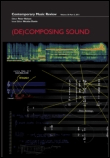
Contemporary Music Review
Exploring the Soundscape of ModernityContemporary Music Review, published by Routledge Journals, Taylor & Francis Ltd, is a leading academic journal in the field of music, renowned for its critical engagement with current practices and theories in contemporary music. Established in the United Kingdom, the journal has evolved since its inception in 1984 and is noted for its significant contributions to a rich understanding of modern musical landscapes. With an impressive Scopus rank of #45 out of 180 in the Arts and Humanities category, placing it in the 75th percentile, it showcases a diverse range of articles addressing innovative research and artistic practices, making it essential reading for researchers, professionals, and students alike. While it operates under a subscription model, the journal prioritizes wide access to vital scholarly work, aiming to broaden discourse and foster a deeper understanding of contemporary music's role in society. The impact factor of the journal adds further weight to its authority, underlining its place in the Q2 category of music journals as of 2023. Engage with the Contemporary Music Review to stay at the forefront of discussions and advancements within the vibrant field of contemporary music.

Studi Musicali-Nuova Serie
Exploring the Depths of MusicologyStudi Musicali-Nuova Serie is a distinguished academic journal dedicated to the field of musicology, published by the esteemed ACCAD NAZ SANTA CECILIA, FONDAZIONE. This journal serves as a platform for the dissemination of cutting-edge research and scholarly discourse surrounding various aspects of music, including historical, theoretical, and applied music studies. While the journal has contributed significantly to the field with its publication span from 2002 to 2009, it has since been recognized for its rigorous academic standards and its role in advancing knowledge in musicology. Despite its coverage being discontinued in Scopus, it continues to hold relevance among researchers, professionals, and students interested in the rich and diverse world of music. Situated in the heart of Rome, at the AUDITORIUM PARCO DELLA MUSICA, this journal embodies the vibrant cultural heritage of Italy while fostering international academic collaboration in music studies.
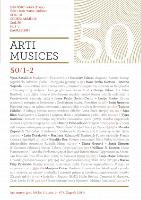
Arti Musices
Pioneering New Ideas in the Study of Music and CultureArti Musices is a distinguished open-access journal published by the Croatian Musicological Society since 2007, dedicated to advancing the field of musicology and related arts and humanities disciplines. Operating from Zagreb, Croatia, this journal aims to provide a platform for scholarly communication, fostering international dialogue among researchers, musicologists, and practitioners. Although it has a current Scopus ranking in the bottom quartile within its category (Q4 in Music), it offers a unique perspective on the musicological landscape, particularly from a regional standpoint. Researchers seeking to contribute to or glean insights from this evolving field will find that Arti Musices serves an important role in disseminating innovative ideas and empirical research. The journal accepts submissions across a broad spectrum of music-related topics, inviting contributions that reflect the complexities and cultural contexts of music today.

RIVISTA ITALIANA DI MUSICOLOGIA
Charting New Territories in Musical InquiryRIVISTA ITALIANA DI MUSICOLOGIA, published by the Italian Society of Musicology, is a distinguished journal dedicated to the field of musicology, offering a platform for scholarly research and discourse on a wide array of musical topics. With an ISSN of 0035-6867 and an E-ISSN of 2036-5586, this journal has contributed significantly to the understanding of music in cultural and historical contexts. Although the scope of coverage was marked from 2003 to 2008 in renowned databases like Scopus, the journal continues to serve as an invaluable resource for researchers, educators, and students embroiled in music studies. Its emphasis on rigorous research and critical analysis makes it a vital asset for anyone seeking to deepen their knowledge of musicological inquiry. While not an open-access publication, the RIVISTA ITALIANA DI MUSICOLOGIA remains a prestigious outlet for scholarly contributions that reach audiences eager to explore the complexities of musical heritage.
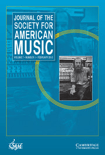
Journal of the Society for American Music
Diving Deep into the Heartbeat of American SoundThe Journal of the Society for American Music is a leading academic journal dedicated to the study of American music and its diverse cultural contexts. Published by Cambridge University Press, this journal serves as a vital platform for researchers and professionals in the fields of musicology, ethnomusicology, and American studies, contributing significantly to scholarly discourse and advancing knowledge in these areas. With an impressive impact factor reflecting its academic rigor, it is placed in Q2 of the music category as of 2023 and ranks #55 out of 180 in the Arts and Humanities segment, placing it in the 69th percentile among its peers. Since its inception, the journal has published a wealth of articles, reviews, and critical studies that explore the rich tapestry of American musical traditions from historical and contemporary perspectives. It operates under a subscription model, ensuring a wide distribution and accessibility to its important findings. Researchers, students, and professionals alike will find the journal an essential resource for advancing their understanding of the dynamic landscape of American music.

ACTA MUSICOLOGICA
Fostering Innovative Research in MusicologyACTA MUSICOLOGICA, published by the International Musicological Society, stands as a pivotal journal within the field of Musicology, garnering attention from scholars and practitioners alike. With its ISSN 0001-6241, the journal serves as a vital platform for innovative research and discourse from 2002 to 2013 and again from 2016 to 2024, achieving a Q2 ranking in the 2023 Music category. Reflecting a commitment to excellence, it ranks #105 out of 180 in Arts and Humanities Music according to Scopus, placing it at the 41st percentile among its peers. Although not open access, ACTA MUSICOLOGICA ensures the dissemination of significant musical research, fostering scholarly exchange and exploration. This esteemed publication is essential for researchers, professionals, and students looking to deepen their understanding of musicology and contribute to ongoing academic conversations.
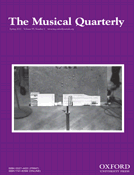
MUSICAL QUARTERLY
Championing High-Quality Music Research Since 1915MUSICAL QUARTERLY, published by Oxford University Press Inc, is a distinguished journal in the field of music, with a publication history that stretches back to 1915. This esteemed journal, identifiable by its ISSN 0027-4631 and E-ISSN 1741-8399, provides a critical platform for scholarly discourse, analysis, and research in musicology and related disciplines, facilitating an understanding of both historical and contemporary musical practices. Although it operates without open access, it continues to attract a diverse readership of researchers, educators, and students alike, thanks to its well-curated articles and reviews that engage with music theory, history, and ethnomusicology. With a current Scopus rank of #119 out of 180 in the Arts and Humanities category and a 34th percentile ranking in Music, MUSICAL QUARTERLY plays a vital role in advancing knowledge and fostering collaboration within the music academic community. Its commitment to high-quality scholarship is reflected in its ongoing efforts to address the evolving landscape of music studies, making it an essential resource for anyone serious about exploring the rich tapestry of music scholarship.